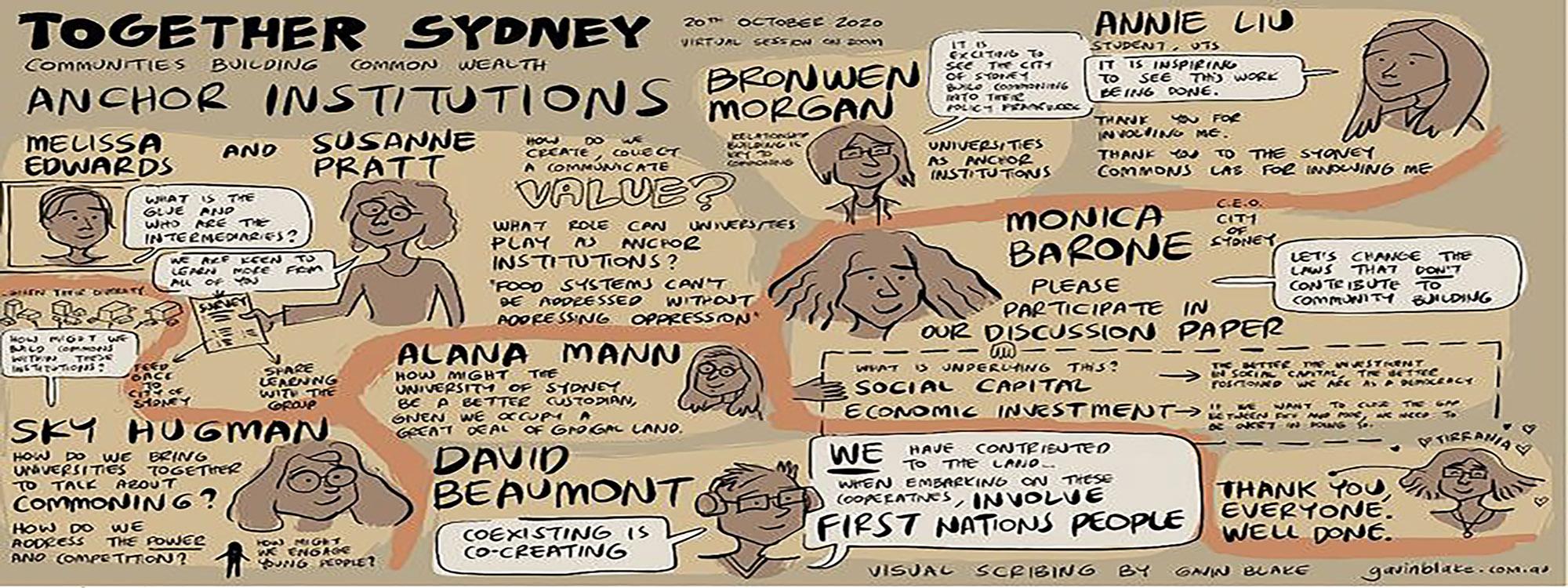
Hub joins forces with a plethora of organisations to explore pathways to build wealth for the common good
The platform cooperativism stream continues to help support an exciting trajectory of work with the Sydney Commons Lab. The Lab brings together community groups, cooperatives, not-for-profits, social enterprises, government and business to explore pathways to build wealth for the common good, especially in relation to access to essential needs such as food, housing, transport and social care.
On 20 October the Sydney Commons Lab, catalysed by InCollaboration and supported by the City of Sydney, hosted a lively and stimulating online gathering entitled ‘Together Sydney: Communities Building Wealth’. The plethora of lightning talks from 20 different speakers, coming from wide variety of perspectives and complemented by a highly active chat column containing links to the deeper evidence base, was a wonderful way to engage the 119 attendees over 3 hours. Find a copy of the speaker pack here.
The outcome was brought further to life by Gavin Blake’s talented visual scribing which is now also animated on Youtube.
The event also represented an excellent opportunity to contribute to the legal infrastructure of community wealth-building. Community wealth-building (CWB) is both a policy framework and grass-roots vision that has had significant traction in both the US (the ‘Cleveland model’) and the UK (the ‘Preston model’), and growing interest in Australia. At its heart are a variety of measures that promote economic democracy and a wider base of shared ownership of economic assets. The legal infrastructure for community wealth-building is particularly vital, since without it, discussions about ‘ownership’ can easily blur into questions of deep participation and co-production which, while crucial, need complementary legal traction in order to truly bite into poverty and inequality. Further, universities play a vital role as ‘anchor institutions’ in the broader ecosystem of community wealth-building, as the scribing image from one part of the October event pictured above indicates.
Opportunities are developing for collaboration between city government, universities and community organisations around this agenda.The City of Sydney in a unanimous motion on July 27, 2020 resolved to “investigate developing a City policy integrating the principles of Community Wealth Building into City operations to make the City of Sydney an ‘anchor institution’ for building and retaining wealth in our area, including through procurement, the use of City land and assets, and increased support for diverse models of ownership and operation that empower communities and share economic benefit more broadly”.
The City will soon release a discussion paper developing these ideas to which the Sydney Commons Lab will contribute feedback. This will build on the Sydney Commons Transition Plan already developed by the Lab in 2019 with the support of the Allens Hub, which has been further developed in 2020 via an Appendix exploring specific links with community wealth-building.
Food enterprises are a particularly fertile space for developing experiments that link the commons to community wealth-building, and the Sydney Commons Lab hopes to work towards a regenerative economy hackathon focused on food in 2021 in collaboration with a number of different Sydney-based universities. One example of a regenerative economy platform cooperative in the food sector is the Open Food Network, an open-source platform that connects farmers and food consumers as directly as possible via multiple local food supply chains. Open Food Network experienced a ten-fold increase in demand in 2020 since Covid-19 disrupted food supply chains. This was underpinned not only by the capacity of the technology to enable a very rapid response on the ground to get food to people in need and to limit food waste. It was equally important that each Open Food System ‘node’ was embedded in a web of local community relationships and linked to other nodes by commons-based governance processes. Embedding digital design in relational governance lays a strong foundation for more ecologically sustainable and resilient supply chains over the long term.